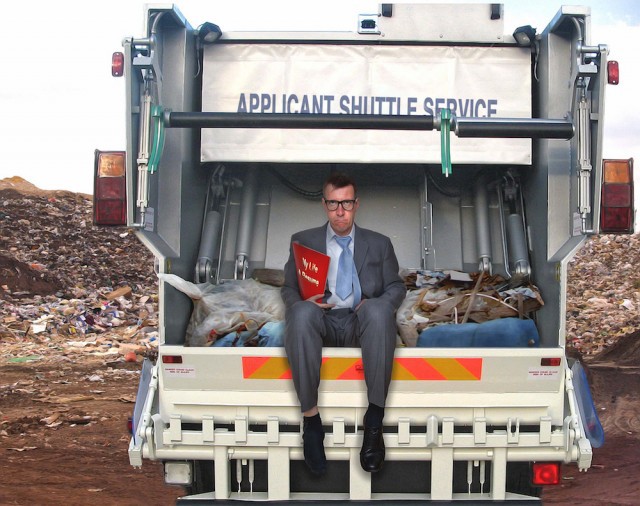How to Be Rejected From a Job
by Stephanie Stern

I’ve bragged about jobs that I’ve rejected, but now it’s time to come clean and tell you about the jobs that have rejected me. Let me state for the record: I am someone who has been rejected from many jobs.
I have a feeling that people don’t talk about this enough (though Mike bravely shared an example of his own). It’s easy to look around at other people’s success. But rarely do we share all of the rejection and misery that went into a finding a job in the first place. Whenever I have applied for a job, I tend to hold it close to my chest. The more I want it, the more tightly I hold it and the more secretive I am. I’m afraid to get my own hopes up, but I’m equally afraid of having to confess to too many people that I’ve been rejected, found wanting, and been passed over for another candidate.
The number of jobs I’ve applied for and never heard back from are too many to count, and there have been handfuls of awkward phone screens that haven’t turned into anything more. It’s easier to not take these rejections, where we’ve never even met face-to-face, personally. But others rejections … some of them have stung a bit.
There have been a few jobs that I’ve interviewed for where I really, really liked the people and the organizations. These were jobs I’d wanted and felt excited about. Leaving the interview, I had imagined my new life, where I’d go to that office daily. I’d think through my new commute, fantasize about laughing with my new coworkers and going the extra mile on the job — only to later find out that they had picked someone else.
If you’ve been through this too, I want to share in your misery. I want to tell you that it will be OK, and that I’ve even learned a few lessons from these experiences on how to be rejected.
Feel Your Feelings (But Don’t Act on Them)
Sometimes, being rejected from a job feels akin to a break up after a few promising dates. It feels sour and prickly to not get something your heart was counting on, or at least hoping for and fantasizing about. It’s ok to feel sad, or angry, or disappointed. Give yourself time to mourn your loss, but don’t do something like fire off an angry, passive-aggressive, or defensive email. Industries are small, and you never know when people come around again. If they really liked you during the interview, but needed someone with different skills, they might come back to you when another position opens up. So be gracious, thank them for considering you. You can feel your feelings privately (and share them with friends), and then move on.
The Gut Knows Best
This lesson has taken me several jobs and unhappy internships to learn: Trust your gut. Even in a short interview, you learn a lot about how it will feel to work with the people and at the organization. When I’ve had weird or bad feelings during interviews, things have usually not turned out well, even when I’ve been offered the job. The opposite is true too. I’ve had interviews where I’ve really clicked with people and felt it could be a great fit, which makes the rejection all the more potent. The lesson here, for me, is that no matter how much the rejection hurts, it’s worth holding out for a job where you feel good in your gut if you can. Being wanted feels good, but it isn’t enough.
You Might Have Hired the Other Person Too
A few years ago, I had a job interview that I thought went especially well. I was quite qualified for the job and had fantastic rapport with the interview team. I left the interview feeling really excited about the position. I didn’t get the job, but they seemed honestly apologetic in their rejection phone call (my gut had been right about the rapport).
I stalked the company website after they updated their staff page to see who they hired instead of me. “Damn, I would have hired her too!” I thought, when I saw the profile of the winning candidate. She had a similar background to me, plus she was fluent in Spanish (one of their desired, but not essential qualifications). She seemed great. It was a reminder to me that the interview had gone well, they did like me, but someone a bit more qualified had applied. This was a big lesson for me. Sometimes, even if you’re qualified and a good fit, even you would have hired the other person.
Looking for a new job can be a frustrating, anxiety-inducing, and sometimes scary process that we all wish we could speed up. Getting rejected from jobs you want is, unfortunately, part of the deal. In the end, though, piling up rejections means that you’re playing the game and going for the positions you want, maybe even stretching a bit for positions you’re not quite qualified for. Even if you don’t want to tell everyone about all the jobs you didn’t get, rest assured, there are lots of us rejects out there.
“The Grindstone” is a series about how we work today by Billfold writers Leda Marritz and Stephanie Stern. Looking for advice? Want to see a specific issue covered in the future? You can email them here.
Steph Stern works in energy and environmental policy in the San Francisco Bay Area. She writes about careers and life choices at Small Answers (or follow on Twitter: @smallanswers).
Photo: David Blackwell
Support The Billfold
The Billfold continues to exist thanks to support from our readers. Help us continue to do our work by making a monthly pledge on Patreon or a one-time-only contribution through PayPal.
Comments